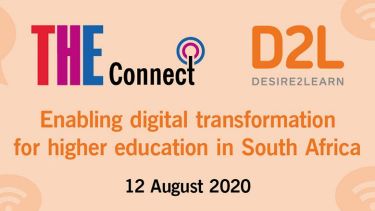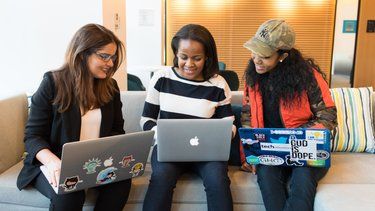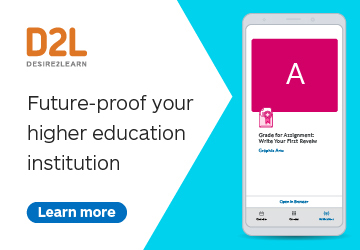At a time of profound change driven by technology, institutions need to keep pace with the digital revolution without dismissing the positives aspects of on-campus learning
Universities must commit to blended learning and personalised teaching while retaining the sense of people and place that make the campus experience unique.
That was the verdict of an expert panel from academia and industry at a THE and D2L webinar on the challenges and opportunities the higher education sector faces in the next phase of digital transformation.
In the wake of the shift to digital that has occurred, chair Ashton Wenborn, special projects deputy editor at THE, asked how universities could future-proof this new way of learning.
Professor Tim McIntyre-Bhatty, deputy vice-chancellor at Bournemouth University, said that universities had to be more than simply “tech-enabled”.
"We want to talk about digital blended pedagogies or fused pedagogies. And we want to talk about what type of student and staff experience actually works well under these sorts of conditions,” he said. “... what have we learned? I think we need to capture the best parts of what’s happened and leave the worst parts behind.”
As universities have been forced to move teaching and learning online, Professor Jason Last, dean of students at University College Dublin, said that it was crucial to procure “technology that’s fit for purpose”. For example, he said that the university had seen an extra 2 million logins to its learning management system in 2020 compared with 2019.
Stewart Watts, vice-president of EMEA at D2L, developer of the Brightspace learning management system, said that tech vendors had a responsibility to assist the “massive upskilling project” for academics and students as blended learning becomes the norm.
“I think everybody has realised that good online learning looks very, very different to good face-to-face learning,” he said. “It requires different types of content to drive engagement. The design of the course structure is completely different … it’s a whole new pedagogy that has had to be learned. The good news is, I think there’s been a recognition that simply delivering lectures online is not good enough.”
One advantage of this new normal is the opportunity to deliver more personalised teaching to students.
Teesside University, which started its digital transformation project in 2016, uses learning analytics to monitor student engagement regardless of where and when they are learning. It allows staff to see how student behaviour has shifted during the pandemic and offers students the chance to compare their learning patterns to their cohort.
“When we talk about analytics, it must not only be from the viewpoint of the institution. It’s also about the student and what is in it for them,” said Jonathan Eaton, academic registrar at Teesside University. “Students are going online to see, ‘how have I engaged this week, this month, with my learning? How does that compare to my peers? And what can I do differently?’”
While changes in learning and teaching are inevitable, the panel agreed that it was important to retain the aspects that make the university experience unique.
“There’s a reason why universities have done things the way they’ve done them for many years. We have to remember that it is about digital transformation; it is also about the sticky campus and social and collaborative learning in the future,” said McIntyre-Bhatty. “There’s something about place that is really important…at Bournemouth, we call it a campus premium.”
Professor Last said that a key takeaway for University College Dublin was students reporting “human interaction” as the thing they had missed most during the first wave of the pandemic. “It is really important to recognise that those interactions are drivers of the student experience and therefore their overall educational success,” he said. “As well as the place that they identify with, it’s the people within the place.”
As institutions settle into a new way of teaching, the sector is rich with opportunities for innovation. Those that most successfully reimagine the university of the future will reap the rewards.
Find out more about D2L’s University of the Future series.
Watch the Times Higher Education and D2L webinar on-demand above or on the THE Connect YouTube channel.





















